As scientists research mushrooms and their numerous active compounds, they are discovering their potential to be a healthy, sustainable food source for future generations.
Mushrooms, as a whole, are often described as superfoods or functional foods, and many of them are adaptogens that restore balance in our bodies by helping them adapt to stressors.
All these benefits come from the many bioactive compounds in mushrooms, including essential vitamins.
Read on to learn more about the benefits of eating mushrooms, what vitamins are in mushrooms and details on the vitamin content of some popular edible mushrooms.
What Are the Benefits of Eating Mushrooms?
Mushrooms aren’t just a delicious addition to meals. They’re nutrient-dense functional foods that offer numerous health benefits.
Apart from being an excellent source of vitamins, mushrooms offer several other benefits, including being:
- Extremely low in calories, carbohydrates and fat and high in dietary fiber, making them an excellent choice for those aiming to maintain a healthy weight.
- A rich source of important minerals like potassium, copper, and selenium that help with proper heart and muscle function, the production of red blood cells, iron absorption and immune health.
- A natural source of antioxidants that protect cells from damage caused by free radicals, helping prevent disease and providing anti-aging effects.
- A non-animal source of high-quality protein with all the essential amino acids, making them an excellent meat substitute for vegetarians and vegans looking to meet their protein needs.
What Vitamins Are in Mushrooms?
Mushrooms are best known as a source of vitamins B and D, but some species also contain vitamin C, and a few provide small amounts of vitamins A, E and K.
B Vitamins

Mushrooms are a fantastic source of various B vitamins that are essential for our overall health and well-being.
There are 8 types of vitamin B, and they’re all water soluble, meaning they’re absorbed for immediate use and, aside from vitamin B12, the body does not store them for long.
At the end of the day, your body excretes any leftover B vitamins, so you need to replenish them daily.
Though each B vitamin has a unique function, they often work together, and all play a role in helping the body convert food into fuel for energy and impact brain function and cell health.
Below are some of the B vitamins commonly found in mushrooms:
- Vitamin B1, or thiamine, is essential for converting carbohydrates into energy and supporting proper brain function. It also plays a role in maintaining a healthy nervous system and supporting heart health.
- Vitamin B2, also known as riboflavin, supports energy production by aiding the metabolism of fats, carbohydrates, and proteins. It’s also a powerful antioxidant, plays a crucial role in red blood cell production and helps maintain healthy skin and eyes.
- Vitamin B3, also known as niacin, plays a role in converting food into energy, is vital for brain function and helps the digestive system. It also aids in maintaining healthy cholesterol levels by boosting good HDL cholesterol.
- Vitamin B5, or pantothenic acid, is essential for converting food into energy and supporting proper metabolism. It’s needed for growth and plays a role in hormone production, keeping the skin healthy and promoting wound healing.
- Vitamin B9, known as folate or folic acid, supports cell growth and division and is crucial for proper brain function. It aids the production of DNA and RNA, making it especially important during pregnancy to promote healthy fetal development.
- Vitamin B12, also known as cobalamin, promotes red blood cell formation, supports healthy brain function and helps with the production of DNA. It is also essential for maintaining proper nerve function and helps to prevent anemia.
Vitamin D
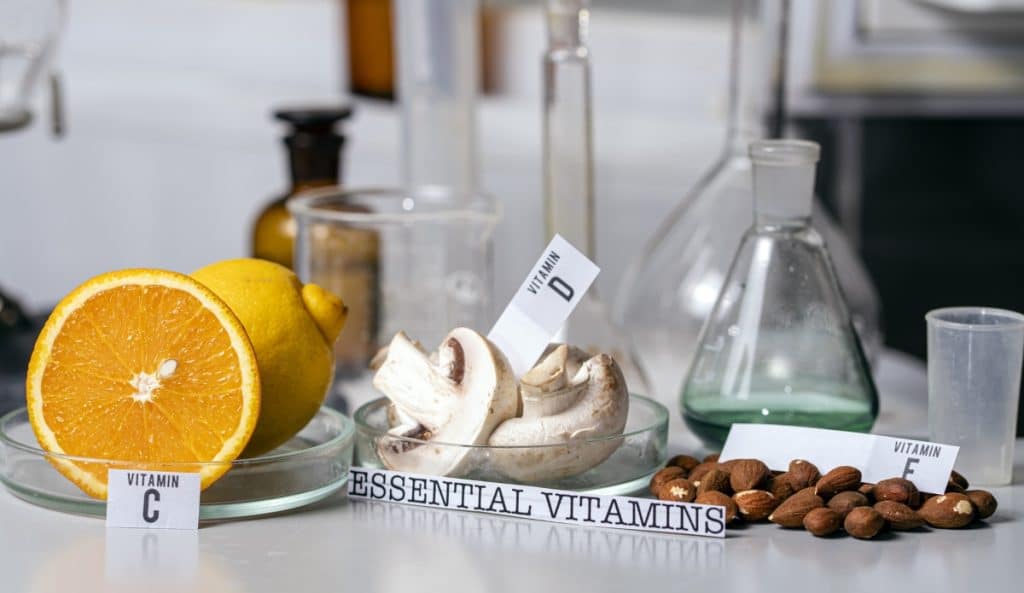
A frequently asked question about the vitamin content of mushrooms is, “Do mushrooms have vitamin D?” The answer is yes, some mushrooms are an excellent source of dietary vitamin D, but not all of them.
Like humans, mushrooms can produce vitamin D when exposed to sunlight or UV light, making them a delicious, natural source of this essential vitamin.
Vitamin D is vital as it helps the body absorb calcium and plays a significant role in maintaining strong bones and teeth. It also supports a healthy immune system, helps regulate mood, and may even help prevent certain chronic diseases.
Not all mushrooms have naturally high levels of vitamin D. Wild varieties that grow in natural sunlight often have higher levels of vitamin D than species that enjoy more shade.
And cultivated mushrooms, like enokis, that are grown in the dark to create specific characteristics will often have little to no vitamin D.
When buying cultivated mushrooms, look for varieties that growers have exposed to sunlight or UV light during cultivation. These are sometimes labeled as vitamin D-enriched.
Research suggests that mushrooms have the potential to be the only non-animal, unfortified food source of vitamin D that provides significant amounts of vitamin D2 in a single serving.
In fact, a 100g serving of vitamin D-enhanced mushrooms can provide up to 100% of the recommended daily consumption of vitamin D.
The table below shows you the Vitamin D in different mushrooms in micrograms, and will give you an idea of their potential as a source of vitamin D.
But remember, these figures vary by producer and also from crop to crop depending on sunlight or UV light exposure.
| Description | Vitamin D | %RDA |
| Recommended Daily Allowance (RDA) of Vitamin D | 20 mcg | |
| White button mushrooms (100g raw) | 0.2 mcg | 1% |
| White button mushrooms exposed to UV light (100g raw) | 26.2 mcg | 131% |
| Cremini mushrooms (100g raw) | 0.1 mcg | 0% |
| Cremini mushrooms exposed to UV light (100g raw) | 31.9 mcg | 159% |
| Portobello mushrooms (100g raw) | 0.3 mcg | 1% |
| Portobello mushrooms exposed to UV light (100g raw) | 28.4 mcg | 142% |
| Maitake mushrooms (100g raw) | 28.1 mcg | 140% |
| Oyster mushrooms (100g raw) | 0.7 mcg | 3% |
| Shiitake mushrooms (100g raw) | 0.4 mcg | 2% |
| Wild chanterelle mushrooms (100g raw) | 5.3 mcg | 26% |
| Wild morel mushrooms (100g raw) | 5.1 mcg | 25% |
Vitamin C
We often associate vitamin C, or ascorbic acid, with citrus fruits, but certain mushroom varieties are also sources of this immune-boosting vitamin.
Vitamin C supports a healthy immune system, aids collagen production for healthy skin, and acts as a powerful antioxidant, protecting cells from damage and reducing the risk of chronic diseases.
The vitamin C content in mushrooms varies from species to species, and many edible mushrooms have little to no vitamin C. But some common, widely-consumed varieties like white button and shiitake mushrooms contain notable amounts of vitamin C.
Vitamin Content of Popular Edible Mushrooms
Let’s take a look at the vitamin content of 10 popular edible mushrooms. The figures below come from My Food Data and the USDA.
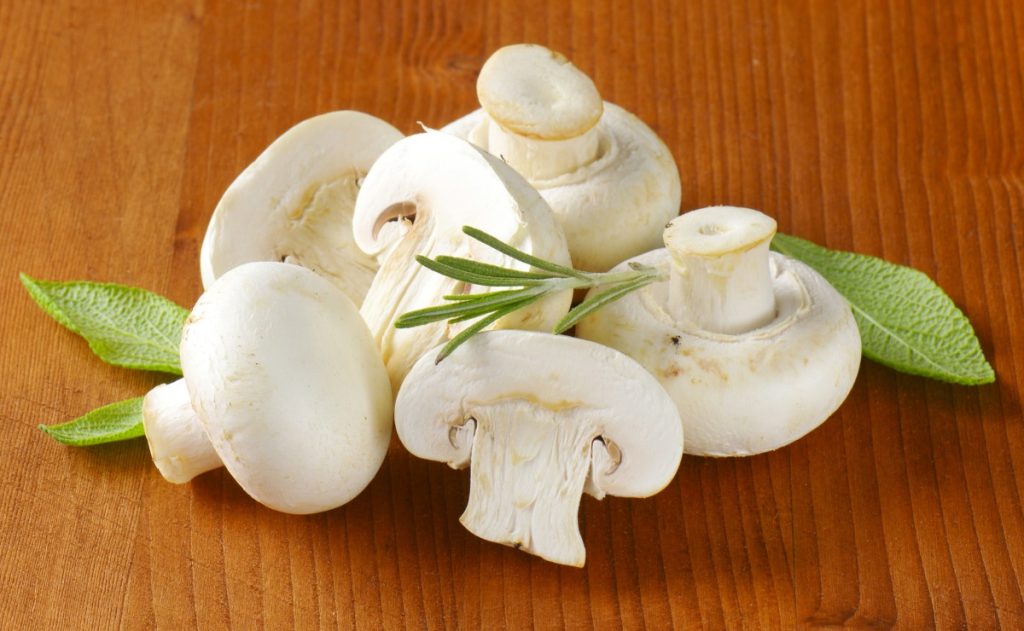
1. White Button Mushrooms
Button mushrooms, scientifically classified as Agaricus bisporus, are some of the most widely cultivated and consumed mushroom varieties worldwide.
Available in most grocery stores, they are the mushrooms that most people use in salads, pizzas, pasta sauces and other savory dishes.
Despite their small size and subtle flavors, they’re packed with nutrients, including several essential vitamins.
If you’re wondering, “What vitamins are in white mushrooms?” Take a look at the table below.
| Vitamins in 100g of button mushrooms | |
| Vitamin C | 2.1 mg |
| Thiamin (B1) | 0.08 mg |
| Riboflavin (B2) | 0.4 mg |
| Niacin (B3) | 3.6 mg |
| Vitamin B5 (PA) | 1.5 mg |
| Vitamin B6 | 0.1 mg |
| Folate (B9) | 17 mcg |
| Vitamin B12 | 0.04 mcg |
| Vitamin E | 0.01 mg |
| Vitamin D | 0.2 mcg |
| Vitamin K1 | 1 mcg |
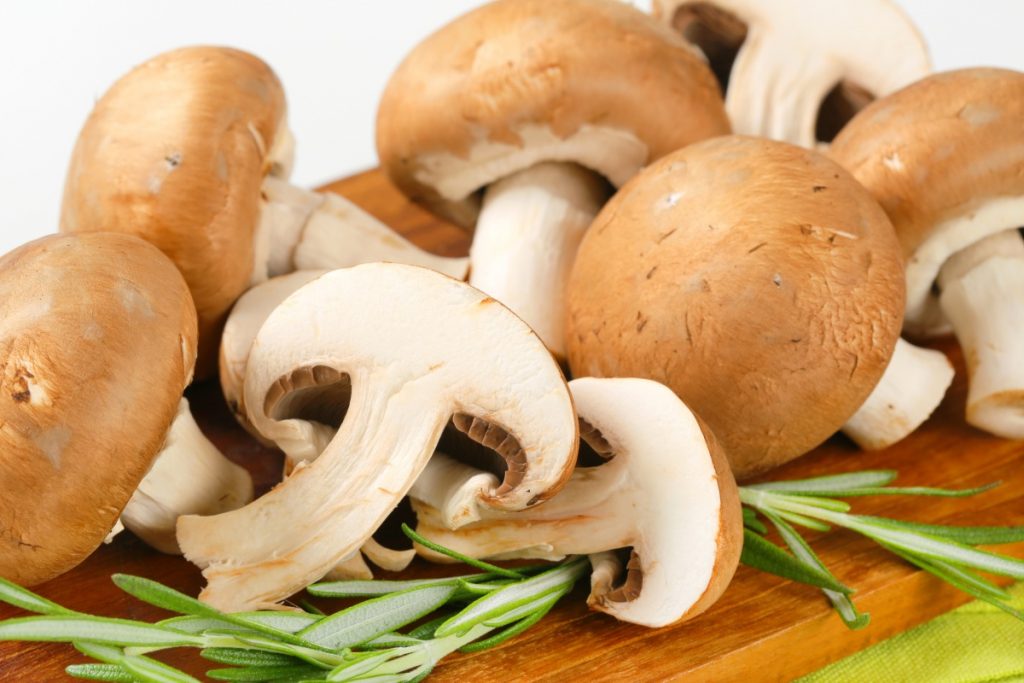
2. Cremini Mushrooms
Cremini mushrooms are a variety of the species Agaricus bisporus, the same family as button and portobello mushrooms.
Almost as common as button mushrooms, they’re light brown to tan in color with a slightly earthy flavor and firm texture.
Growers allow them to mature slightly longer than button mushrooms, giving them deeper flavors and making them popular with chefs.
| Vitamins in 100g of cremini mushrooms | |
| Thiamin (B1) | 0.1 mg |
| Riboflavin (B2) | 0.49 mg |
| Niacin (B3) | 3.8 mg |
| Vitamin B5 (PA) | 1.5 mg |
| Vitamin B6 | 0.11 mg |
| Folate (B9) | 25 mcg |
| Vitamin B12 | 0.1 mcg |
| Vitamin E | 0.01 mg |
| Vitamin D | 0.1 mcg |
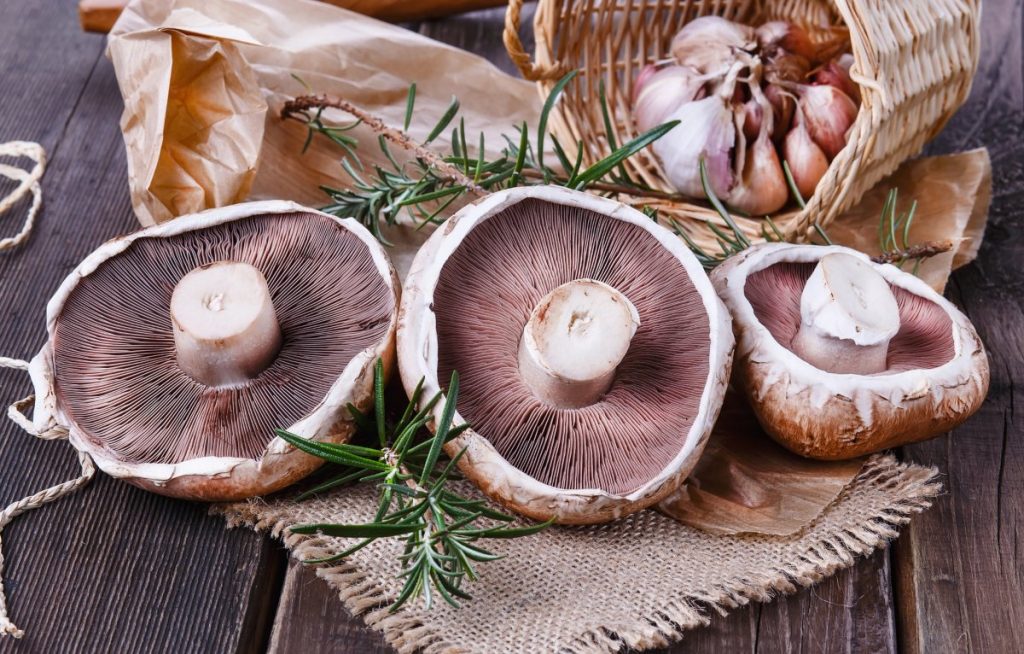
3. Portobello Mushrooms
Portobello mushrooms are the mature version of Agaricus bisporus, and they have large flat caps, dark gills and deep, earthy flavors.
Their substantial size, meaty texture and rich flavor make portobello mushrooms an excellent beef substitute for vegetarians and vegans.
Whether grilled as a burger patty, served as a steak or stuffed with delightful fillings, portobello mushrooms are delicious, and every serving provides loads of dietary fiber, minerals and vitamins.
| Vitamins in 100g of portobello mushrooms | |
| Thiamin (B1) | 0.06 mg |
| Riboflavin (B2) | 0.13 mg |
| Niacin (B3) | 4.5 mg |
| Vitamin B5 (PA) | 1.1 mg |
| Vitamin B6 | 0.15 mg |
| Folate (B9) | 28 mcg |
| Vitamin B12 | 0.05 mcg |
| Vitamin E | 0.02 mg |
| Vitamin D | 0.3 mcg |
| Vitamin K1 | 1.8 mcg |
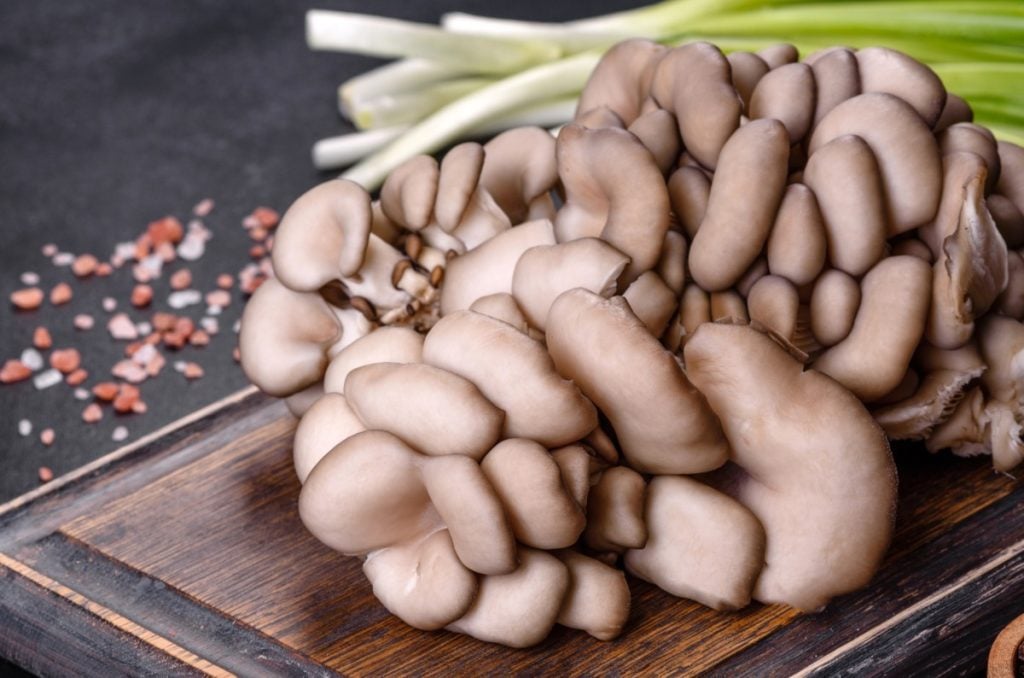
4. Oyster Mushrooms
Oyster mushrooms are some of the most popular gourmet mushrooms and are prized for their unusual colors, unique flavors and meaty texture.
They’re one of the easiest mushroom species to grow and also one of the most profitable, making them extremely popular with small-scale mushroom farmers.
Their delicate, fan-shaped caps and velvety texture bring a touch of elegance to any dish while providing a host of nutritional benefits, including essential vitamins.
| Vitamins in 100g of oyster mushrooms | |
| Vitamin A | 2 mcg |
| Thiamin (B1) | 0.13 mg |
| Riboflavin (B2) | 0.35 mg |
| Niacin (B3) | 5 mg |
| Vitamin B5 (PA) | 1.3 mg |
| Vitamin B6 | 0.11 mg |
| Folate (B9) | 38 mcg |
| Vitamin D | 0.7 mcg |
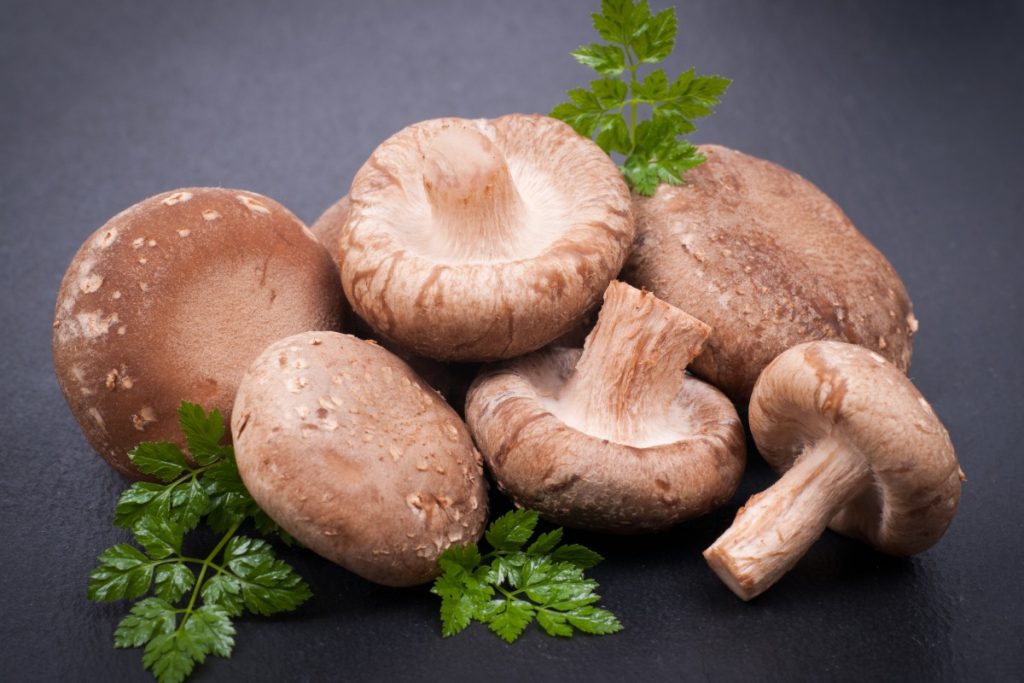
5. Shiitake Mushrooms
Shiitake mushrooms (Lentinula edodes) have distinctive umbrella-shaped caps, rich umami flavors and a meaty texture.
For centuries, Asian cultures have prized shiitakes for their incredible flavor and medicinal properties and used them to boost health and longevity.
Now, the rest of the world has caught on, and they’ve become one of the most cultivated mushroom species worldwide.
Nutrient-dense shiitake mushrooms contain loads of dietary fiber, antioxidants, minerals and vitamins.
| Vitamins in 100g of shiitake mushrooms | |
| Vitamin C | 0.3 mg |
| Thiamin (B1) | 0.02 mg |
| Riboflavin (B2) | 0.22 mg |
| Niacin (B3) | 3.9 mg |
| Vitamin B5 (PA) | 1.5 mg |
| Vitamin B6 | 0.29 mg |
| Folate (B9) | 13 mcg |
| Vitamin B12 | 0.04 mcg |
| Vitamin D | 0.4 mcg |
| Vitamin K1 | 0.1 mcg |
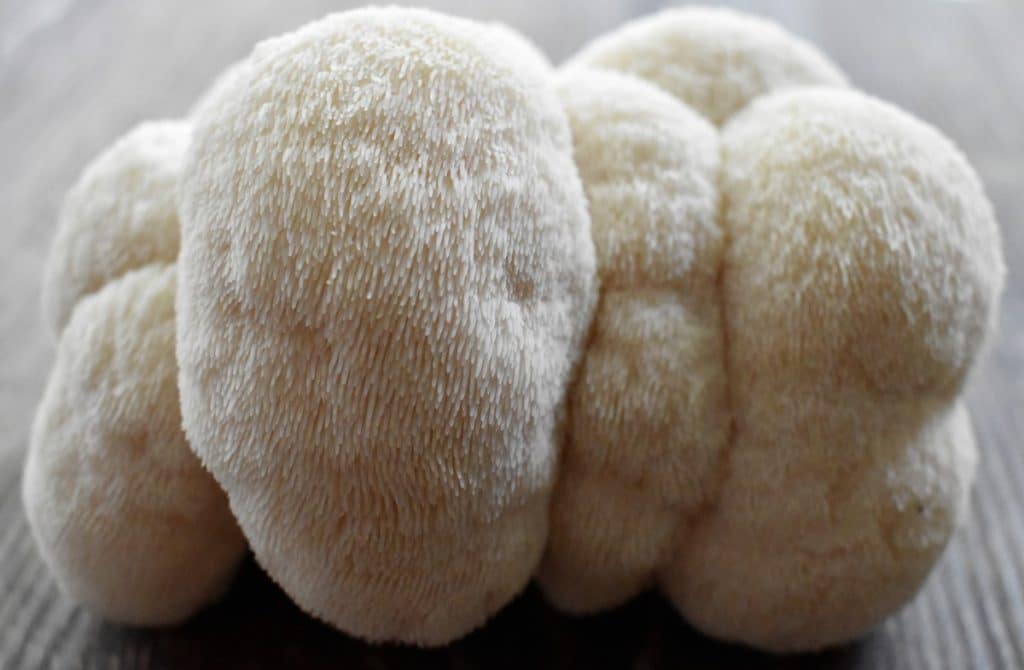
6. Lion’s Mane Mushrooms
Lion’s mane mushrooms (Hericium erinaceus) are unusual-looking gourmet and medicinal mushrooms known for their brain-boosting benefits.
They have teeth or needles instead of gills that create a meat-like texture when cooked and a mild, slightly sweet flavor similar to crab or lobster.
Apart from being a great source of B vitamins, lion’s mane contains hericenones and erinacines. These compounds can cross the blood-brain barrier, and studies show they have the potential to stimulate the growth and repair of brain cells.
| Vitamins in 100g of lion’s mane mushrooms | |
| Thiamin (B1) | 0.15 mg |
| Riboflavin (B2) | 0.36 mg |
| Niacin (B3) | 1.63 mg |
| Biotin (B7) | 16.9 mcg |
| Folate (B9) | 30 mcg |
| Vitamin D | 0.02 mcg |
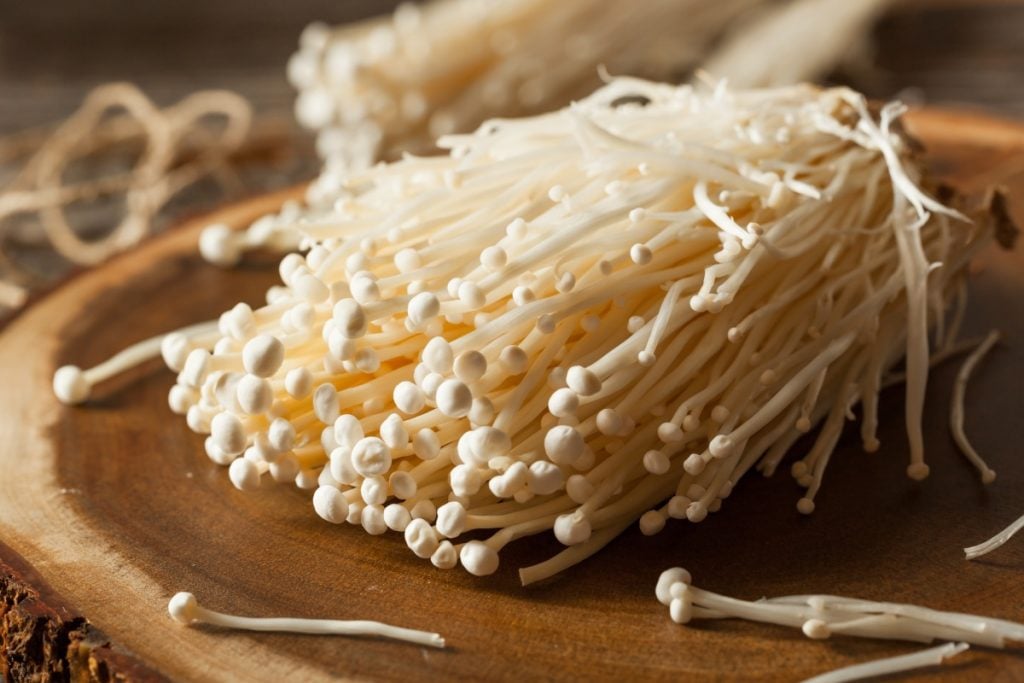
7. Enoki Mushrooms
Cultivated Enoki mushrooms (Flammulina filiformis) are popular gourmet mushrooms and one of the more unique species you’ll come across.
They’re specially grown to have long, thin stems and tiny caps that add visual appeal, delicate flavors and a crunchy texture to salads, soups and stews.
Popular in Asian cuisine, enokis contain several biologically active compounds and are a good source of copper, niacin (Vitamin B3), antioxidants and essential amino acids.
| Vitamins in 100g of enoki mushrooms | |
| Thiamin (B1) | 0.23 mg |
| Riboflavin (B2) | 0.2 mg |
| Niacin (B3) | 7 mg |
| Vitamin B5 (PA) | 1.4 mg |
| Vitamin B6 | 0.1 mg |
| Folate (B9) | 48 mcg |
| Vitamin E | 0.01 mg |
| Vitamin D | 0.1 mcg |
| Vitamin K1 | 0.5 mcg |
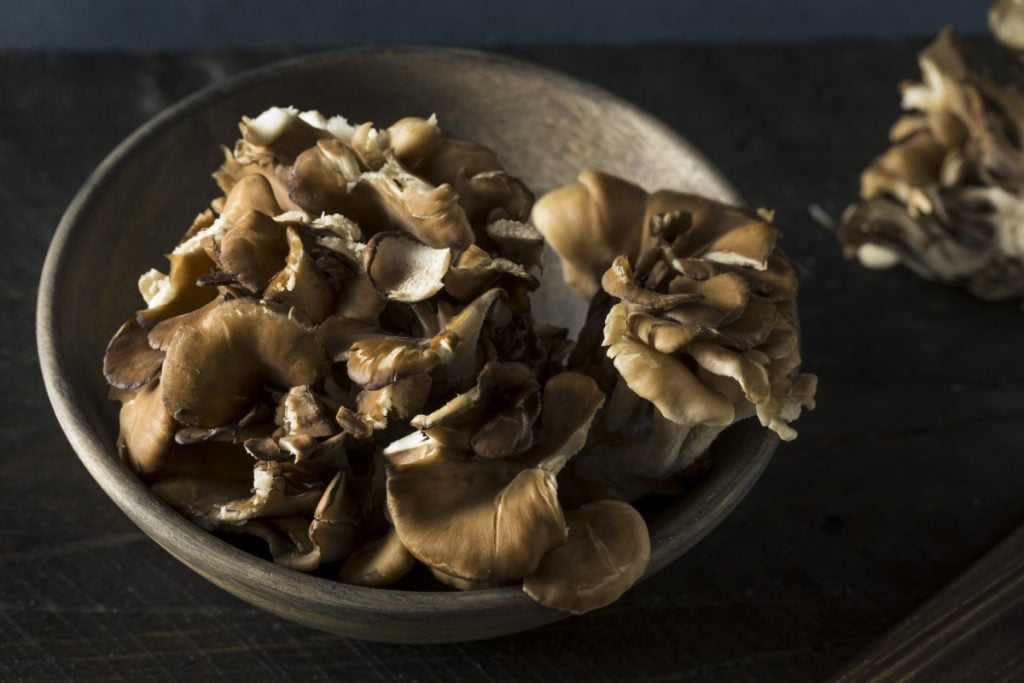
8. Maitake Mushrooms
Maitake mushrooms (Grifola frondosa), also known as “hen of the woods,” are not only delicious but come with a history of medicinal use that dates back centuries.
They are exceptionally versatile in the kitchen and contain numerous beneficial compounds like beta-glucans, potassium and amino acids.
They’re also a great source of vitamin D and contain high levels of vitamin C and niacin (B3).
| Vitamins in 100g of maitake mushrooms | |
| Vitamin C | 2 mg |
| Thiamin (B1) | 0.15 mg |
| Riboflavin (B2) | 0.24 mg |
| Niacin (B3) | 6.6 mg |
| Vitamin B5 (PA) | 0.27 mg |
| Vitamin B6 | 0.06 mg |
| Folate (B9) | 21 mcg |
| Vitamin E | 0.01 mg |
| Vitamin D | 28.1 mcg |
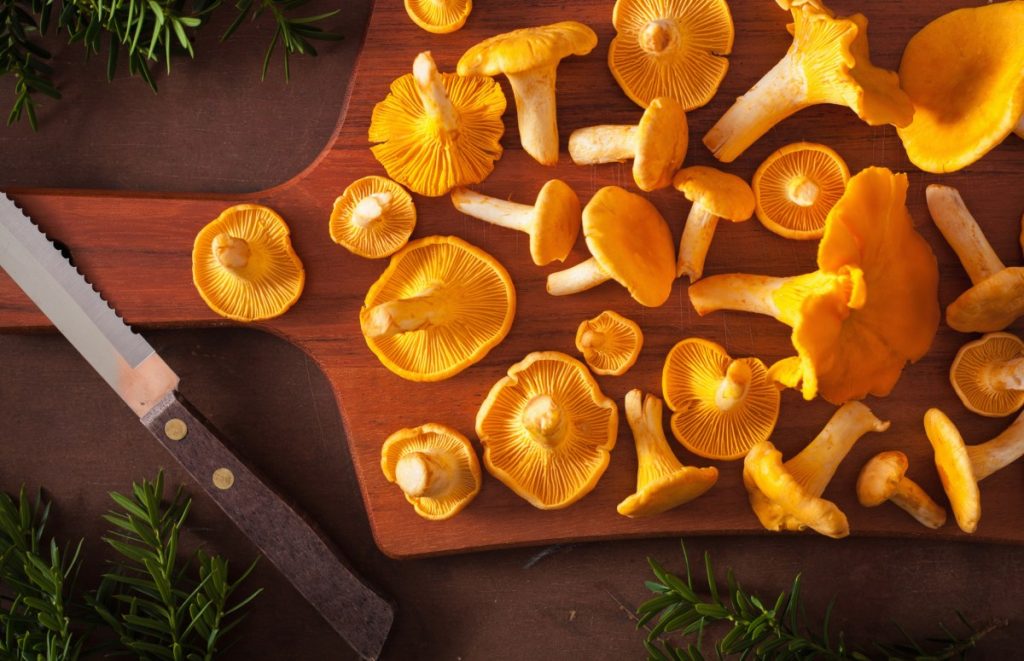
9. Chanterelle Mushrooms
Chanterelle mushrooms have a distinctive trumpet-like shape, bright yellow to orange colors and a rich, earthy flavor that’s earned them a reputation with chefs and foragers.
These golden mushrooms are mycorrhizal and usually harvested in the wild as they’re tricky to cultivate and need to grow among the roots of living trees like oak, beech, birch or spruce trees.
Chanterelles make a delicious addition to any meal and are a good source of dietary fiber, copper, iron and vitamin D.
| Vitamins in 100g of chanterelle mushrooms | |
| Thiamin (B1) | 0.02 mg |
| Riboflavin (B2) | 0.22 mg |
| Niacin (B3) | 4.1 mg |
| Vitamin B5 (PA) | 1.1 mg |
| Vitamin B6 | 0.04 mg |
| Folate (B9) | 2 mcg |
| Vitamin D | 5.3 mcg |
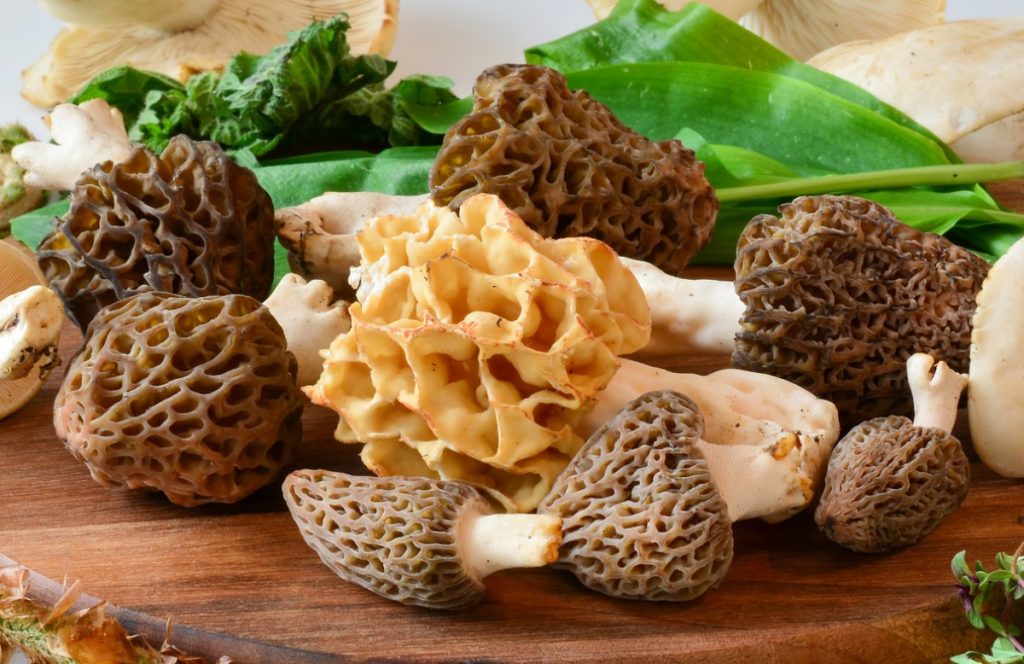
10. Morel Mushrooms
Morel mushrooms are some of the most sought-after and expensive mushrooms in the world and are prized by chefs for their unique appearance, firm, meaty texture and nutty taste.
Aside from tasting great, they’re full of nutritional benefits and contain plenty of protein, fiber and antioxidants that aid digestion and help modulate blood sugar levels.
Morels grow in rich soils, and as a result, they’re full of vitamins and minerals and a good source of copper, iron, manganese, zinc, vitamin D, folate (B9) and niacin (B3).
| Vitamins in 100g of morel mushrooms | |
| Thiamin (B1) | 0.07 mg |
| Riboflavin (B2) | 0.21 mg |
| Niacin (B3) | 2.3 mg |
| Vitamin B5 (PA) | 0.44 mg |
| Vitamin B6 | 0.14 mg |
| Folate (B9) | 9 mcg |
| Vitamin D | 5.1 mcg |
Does Cooking Destroy the Vitamins in Mushrooms?
Cooking doesn’t necessarily destroy the vitamins in mushrooms. In fact, some vitamins and other active compounds can become more accessible through cooking.
Vitamins are either fat-soluble or water-soluble, and the cooking method you choose impacts how many of these vitamins you lose.
The best way to retain vitamins and nutrients when cooking mushrooms is to use short cooking times and as little liquid as possible.
Vitamins A, D, E, and K are the four fat-soluble vitamins that get lost when you fry mushrooms in a lot of oil as they leach out into the oil left in the pan.
The nine water-soluble vitamins are the B vitamins and vitamin C. You lose these when you boil mushrooms for long periods as they leach into the water.
But if you’re making a delicious soup or stew and consume all the liquid used to cook the mushrooms, you’ll still get the benefit.

Best Way to Cook Mushrooms
Grilling, roasting, steaming, stir-frying or microwaving generally preserves more vitamins and other nutrients than boiling.
According to a 2017 study by scientists from the Mushroom Technological Research Center of La Rioja, grilling and microwaving were the healthiest ways to cook mushrooms.
Frying and boiling can reduce the proteins and antioxidant compounds, including vitamins, in the mushrooms, while microwaving or grilling causes no significant losses in nutritional value.
We like to saute mushrooms in a little olive oil or butter for a few minutes to enhance their unique flavor and texture.
Final Thoughts
The amount of vitamins in mushrooms varies from species to species and is also affected by their growing conditions and how you cook them.
Generally, though, mushrooms are an excellent source of water-soluble B vitamins that you need to replenish daily, as they’re crucial for energy production, cell health and brain function.
When exposed to sunshine or UV light while growing, mushrooms are also a good source of vitamin D, making them a valuable addition to a vegetarian or vegan diet.
But the vitamins found in mushrooms are not the only reason to eat them. They also contain beneficial dietary fiber, minerals and amino acids and are low in calories, fat and carbohydrates.
To learn more about mushrooms and their numerous benefits, visit our Mushroom Education Hub.
